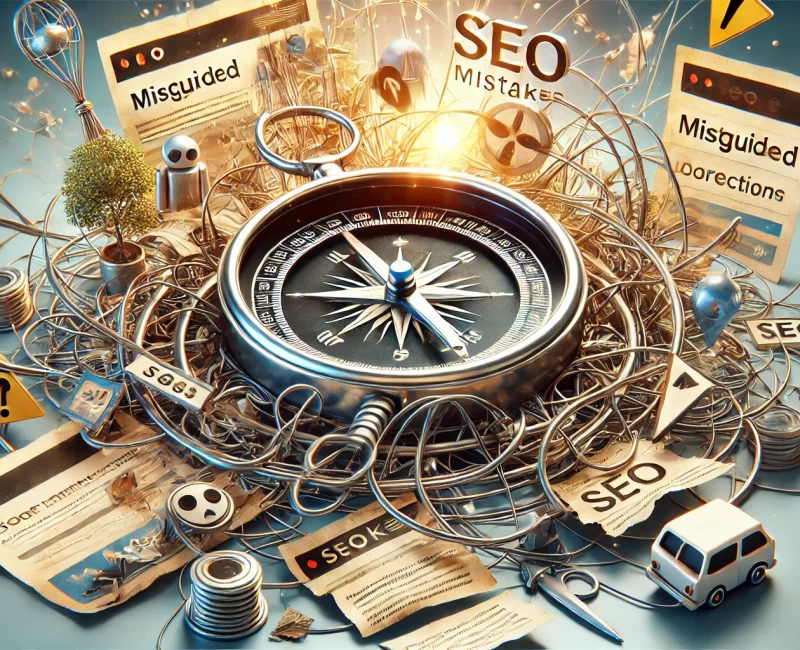
The digital marketing industry, specifically the search engine optimisation (SEO) sector, is awash with awards. SEO agencies parade these accolades on their websites and social media, using them as badges of credibility and proof of excellence. However, many industry insiders know these awards aren’t always what they seem.
In many cases, SEO awards are little more than superficial trophies (read: circle-jerks), often bestowed upon agencies that have mastered the art of self-promotion rather than the craft of SEO itself.
So here’s the scope of why SEO awards are often rubbish and why many agencies don’t actually deserve them.

Pay-to-Play Nature of SEO Awards
One of the biggest criticisms of SEO awards is the pay-to-play nature of the industry. Many SEO award events are funded by agencies paying hefty submission fees to be considered for an award. A typical scenario involves agencies submitting themselves for a variety of award categories, often having to pay for each submission.
For smaller agencies or those focused on delivering real value to their clients without splurging on flashy awards ceremonies, this creates a highly uneven playing field. SEO should be about results and expertise, not about which agency can afford to bankroll award entries or wine-and-dine judges.
Example: Many SEO awards ask for submission fees that can range anywhere from £100 to £500 per category. Some of the more prominent SEO award organisations even encourage agencies to submit in multiple categories, raking in thousands of pounds from a single agency. This system inherently favours large, well-funded agencies that can afford to submit to multiple categories, leaving smaller but potentially more skilled agencies in the dust.

Subjective Judging and Questionable Criteria
Another issue is the subjectivity of the judging process. SEO, as a discipline, is data-driven and results-oriented. The success of an SEO campaign can be measured by tangible metrics like search rankings, organic traffic increases, and revenue growth. However, SEO awards are often judged based on vague or overly simplified criteria, such as “creativity” or “best campaign.” While creativity is valuable, SEO is primarily about delivering measurable outcomes, not just creating a buzz with quirky ideas.
The judging process can also be prone to favouritism or bias. In some cases, judges are industry insiders who may have pre-existing relationships with certain agencies. This undermines the credibility of the awards and leads to situations where certain agencies seem to win repeatedly, not because their work is truly the best, but because they are part of the “in crowd.”
Example: Consider the case of an agency winning “Best Local SEO Campaign” at a major award ceremony. Upon closer examination, the campaign may not have actually moved the needle for their client’s local search rankings or resulted in significant traffic growth. But because the agency submitted a slick, well-written entry with impressive visuals, they were able to dazzle the judges into awarding them. Meanwhile, an agency that delivered massive ranking improvements for a local client might go unnoticed simply because their entry wasn’t as polished or flashy.

The Fluff Factor: Style Over Substance
Many SEO awards are awarded to agencies that focus on aesthetic appeal and flashy campaigns, rather than hard SEO results. A campaign that wins an award might have a fantastic video or clever PR stunt, but when it comes down to actual performance—ranking for high-value keywords, increasing conversions, or improving ROI—it can fall flat.
SEO is a long game, one that requires patience, constant testing, and a keen eye on the metrics that matter. Awards that focus too much on how “cool” or “unique” a campaign appears to the outside world end up undervaluing the deep, technical work that true SEO success requires.
Many agencies, especially those competing for awards, tend to focus on short-term wins or flashy tactics to impress the judges. But clients hire SEO agencies for the long-term benefits—sustainable ranking improvements, better user experience, and real business results. Award entries that prioritise style over substance miss the point of SEO entirely.
Example: An agency might win an award for a campaign that included a viral video or an attention-grabbing infographic that got picked up by a few publications. But when you dig into the actual SEO results, you might find that the campaign had little impact on organic traffic, rankings, or revenue. It’s easy to win an award by focusing on surface-level appeal rather than the real SEO impact.
A Focus on Client Size, Not Campaign Effectiveness
It’s not uncommon to see the same large brands winning SEO awards year after year. These brands often have massive budgets that allow their agencies to create extensive campaigns. While these large campaigns may be impressive in scope, they often receive disproportionate attention simply because of the brand’s clout.
Smaller agencies working with mid-tier clients or local businesses might produce outstanding results, but they often go unrecognised because their campaigns don’t have the same “wow factor” as those tied to larger brands. This skews the awards towards agencies that serve high-profile clients, rather than those that deliver genuine SEO value to businesses of all sizes.
Example: If a large multinational corporation receives a 5% lift in organic traffic, it might translate to thousands of visitors and millions in revenue, and the agency responsible may be praised as an SEO genius. But that same 5% lift for a small local business may not even get a mention, even though the impact on that smaller business is far more significant. Awards tend to favour big-name brands because they’re recognisable and glamorous, but they often ignore the true value delivered by agencies working with smaller clients.

Lack of Transparency and Accountability
When an SEO agency wins an award, the details of the campaign’s success are often cloaked in vague descriptions or carefully selected metrics that paint the agency in the best possible light. Very rarely are these award-winning campaigns subjected to the same level of scrutiny as real-world case studies would be.
In the real world, SEO campaigns are messy, involve constant adjustment, and don’t always result in immediate success. The transparency that should come with evaluating an SEO campaign—such as looking at month-on-month data, keyword difficulty, competition, and long-term sustainability—is often missing in award submissions. Agencies can cherry-pick the best numbers or showcase only a small snapshot of what happened, omitting the full picture of whether the campaign truly delivered long-term value to the client.
Example: An agency may win an award by showcasing that they increased a client’s organic traffic by 50%. However, they might conveniently leave out the fact that this increase came from targeting low-competition, low-value keywords that don’t contribute to the client’s bottom line. The lack of transparency in how results are achieved is a major issue in the world of SEO awards.

Awards Do Not Equal Client Success
Lastly, and perhaps most importantly, an SEO award is not a reliable indicator of an agency’s ability to generate success for their clients. Just because an agency has won multiple awards does not mean they are the right fit for your business or that they’ll deliver the same results for you.
SEO is highly context-dependent. What works for one business may not work for another. An agency that wins an award for a campaign with a large, well-known client might struggle to replicate that success with a smaller, niche business in a highly competitive market. Unfortunately, many businesses make the mistake of choosing an agency based on their trophy case rather than their actual SEO expertise and track record with similar clients.
Example: Agencies with a room full of awards often make it seem like they have the magic touch when it comes to SEO. But when you look at their actual client case studies or speak to past clients, you may hear a very different story. They might excel at self-promotion and award submissions, but their day-to-day SEO work could leave much to be desired.
Conclusion: Focus on Results, Not Awards
In the end, SEO awards can be a shiny distraction that mislead businesses into thinking they are choosing the best agency. While some awards are earned through genuine achievement, many are little more than self-congratulatory patting on the back within the industry.
Businesses looking for SEO agencies should focus on track records, case studies, and the actual results agencies deliver for their clients. Don’t be dazzled by the awards on the wall—ask hard questions about their SEO process, transparency, and the sustainability of their results.
In the SEO world, actions speak louder than trophies. Always remember that it’s the outcomes that matter, not the shiny hardware collecting dust on a shelf.

Disclaimer:
This post was generated with the assistance of AI and does not necessarily reflect the author’s personal views in their entirety. However, based on personal experience, the author finds themselves inclined to agree with several of the issues raised in the article. The opinions and statements within the post should be interpreted as a general discussion, rather than a definitive expression of the author’s stance.









